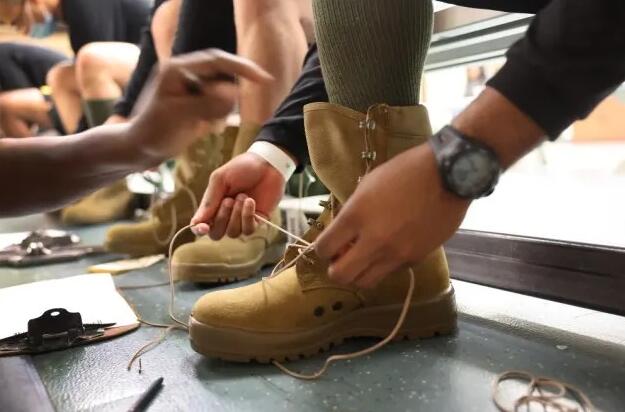Shoes are perhaps the most important item of clothing or gear for a soldier. Whether traversing the rocky mountains of Afghanistan or the blistering sands of Iraq, soldiers need footwear that both protects and supports their feet in extreme environmental conditions.
That reality spurred a partnership between the University of Massachusetts Lowell, the United States Army’s Combat Capabilities Development Command (DEVCOM) and the U.S. Footwear Manufacturers’ Association, resulting in the creation of a program called Supporting Warfighters through Innovative Footwear Technologies (SWIFT).
Funded by Congress, the program aims to allow U.S. textile manufacturers, suppliers and universities to work together to find innovative solutions to the footwear challenges faced by military personnel with products made in America.
“Boots have literally become synonymous with the U.S. soldier, and it’s encouraging that Congress has found the funding for this program,” said Michael Codega, chief technology officer at the DEVCOM Soldier Center.
Codega joined representatives from UMass Lowell and others from the military and the footwear industry during an event on May 31 to outline some of the program’s objectives and highlight the critical role the U.S. textiles and footwear industries play in better equipping soldiers.
A product of the Harnessing Emerging Research Opportunities to Empower Soldiers (HEROES) partnership between UMass Lowell and the DEVCOM Soldier Center and U.S. footwear manufacturers, the SWIFT program includes 14 research projects that explore innovative ways to improve military footwear. Projects include developing passive alternative thermal insulation, sensors for detecting frostbite, alternatives to leather and comfort improvements—and these innovations go beyond combat boots.
“Our soldiers need footwear that’s going to improve performance, prevent injuries and provide comfort,” said Anita Perkins, footwear research engineer for the soldier clothing, footwear and integration team, DEVCOM Soldier Center. “We are to research advanced materials and technology that are going to improve the performance of not only our footwear for soldiers, but also other military personnel with athletic shoes.”
Among the projects, researchers at UMass Lowell are looking at novel 3D printing technologies for creating the midsole and outsole of shoes.
“Outsole printing focuses on the 3D printing of compound rubbers, and then the midsole focuses on 3D printing of polymeric foams from thermoplastic materials,” said Ram Nagarajan, professor at UMass Lowell. “In the first phase, we have demonstrated the feasibility of both of these processes for these soles. And then this project moves into a second phase next year, where we will look into the integration of these two additive manufacturing processes as one platform.”
That second phase of the SWIFT program will kick off in 2025 with nine projects, many focusing on extreme weather performance and the improvement of training shoes.
One of the major ways SWIFT aims to achieve its goals is transitioning footwear research from a purely academic pursuit to addressing real-world applications in manufacturing facilities. The group has partnered with industry collaborators in several states with the goal of continuing to expand that reach.
Because the Department of Defense is required to prioritize the purchase of domestically manufactured or produced goods under the Berry Amendment, working with American footwear companies and suppliers is critical to the success of the SWIFT project. And Bill McCann of the U.S. Footwear Manufacturers’ Association says the industry has stepped up its technological capability to not only meet the innovation demands of military footwear, but to be able to do so in a cost-effective way.
“New technologies like robotics, additive manufacturing, data analytics and artificial intelligence have increased automation and reduced the cost-of-labor advantages that countries like China and Vietnam have over the U.S.,” he said. “Also, the pandemic exposed us as a nation that has a hard time making what we need in a crisis, and that has spurred a lot of entrepreneurship and investment in our industry and rebuilding our supply chain.”
Building a strong domestic supply chain goes beyond simply meeting the Berry Act requirement. Sean Scott, co-founder of TOMS and current CEO and founder of custom shoe company ComunityMade, said the work of the SWIFT project has the potential to positively impact the shoe industry in myriad ways by reshoring production to the U.S.
“If we look at overseas manufacturing as it is today, we’re often reliant on a single source for components and finished goods,” he said. “Now we have smoldering geopolitical and human rights issues. Then long lead times and high minimums that lead to inventory risk. And I think this might even apply to the military in this case, but for sure it applies to retail because that high inventory risk means it ties up money, ties up storage space, and leads to waste because you have to predict the demand years ahead of time.”
McCann said Congress approved $3 million for the first phase of SWIFT, with $10 million more per year appropriated for the next two years, and an additional $10 million pending. And according to Scott, that funding and the work it facilitates can lead to not only better footwear for the military, but improvements to domestic manufacturing across the board.
“With the opportunity to apply modern technology to domestic manufacturing, I believe there’s innovation for all industries that can come from the footwear industry,” he said. “Innovative ways to apply additive manufacturing, innovative ways to apply computer knitting or 3D knitting. There are innovative ways to do construction without stitching with 3D bonding. So we have the opportunity to invest in technologies that are going to help manufacturing as a whole.”



